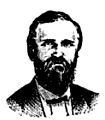Robert Benjamin Headden (born 1838 in Cassville, Georgia into an Old Line English Baptist family), of Bartow County, Georgia, enlists with Philip’s Legion today. His first major action is in 1862 in the Seven Days Battle and the 2nd Battle of Manassas, at which he is wounded. Recovering, Headden fights in the battle of Fredericksburg in December 1862. He also fights in Gettysburg in July 1863. While fighting for control of little round top, Headden’s right side is mangled from an exploding artillery shell. He lies wounded on the battlefield for as long as two days before being captured by Union forces on July 4. In October 1863 he is exchanged, and following several more months of healing, returns yet again to fight for the Confederacy, being present at General Robert E. Lee’s surrender at Appomattox.
While Headden had become a Christian in 1855 at age 16, it is in the post-war years that he enters the Baptist ministry. In 1870 he is called to pastor First Baptist Church of Cartersville, Georgia, where he remains for thirteen years. In 1883, Headden becomes the pastor of the First Baptist Church of Rome, Georgia, a position he holds for thirty years (and during which time he offers a moving tribute to Jefferson Davis upon the death of the former Confederate president in 1889). He also serves as a trustee of the Southern Baptist Theological Seminary in Louisville, Kentucky; a trustee of Mercer University in Macon, Georgia; and president of Georgia Baptist’s state board of missions.
Headden also remains a loyal Confederate and defender of the “Lost Cause,” a post-war myth predicated upon belief in the rightness of the Southern white cause of African slavery during the war:
“All of his life he carried a feeling and torch for the “Lost Cause”, and he was awarded the Cross of Honor by the United Daughters of the Confederacy in the early 1900’s. In 1913 he returned to Gettysburg for the fiftieth reunion of the blue and gray. As he walked to the spot where he had been so terribly wounded a half century earlier, he suffered a stroke. He was removed from the battlefield once again and housed in a local hospital. As soon as he could be moved he was transported back to his home in Rome. This time he would not recover. He died on August 14, 1913 and was buried at Myrtle Hill Cemetery. There was a fountain erected in the cemetery in his memory. Later it was removed to the grounds of 1st Baptist, where it remains today.”
Headden’s life touched many people, perhaps most notably Lottie Moon. It was upon listening to a mission sermon by Headden at Cartersville’s First Baptist Church that she surrendered to mission work.
A prominent Georgia Baptist, Headden’s life story encapsulates the irony of the legacy of the Civil War in the South. While many devote Southern Baptist men fight to defend the righteousness of African slavery, and afterwards some survive and become prominent in the post-Civil War South. The sins of slavery and racism cling tightly to many of these men throughout the remainder of their lives, even as they serve God in other causes worthwhile.
Sources: Mike Ragland, “The Fightin’ Parson of Bartow County” (link) and Samuel Boykin, History of the Baptist Denomination in Georgia, vol. 2 (1888), pp. 258-259 (link); tribute to Davis noted (link); Headden obituary and memorial tributes (link)



